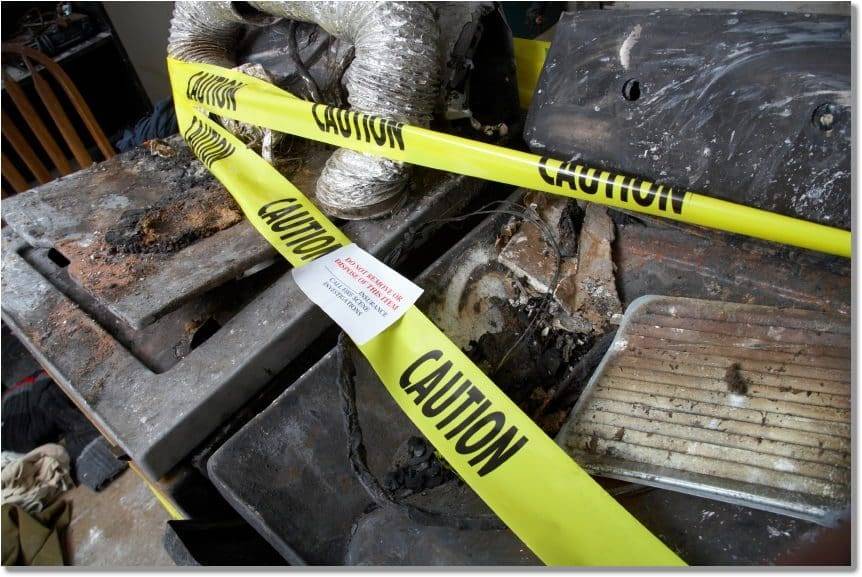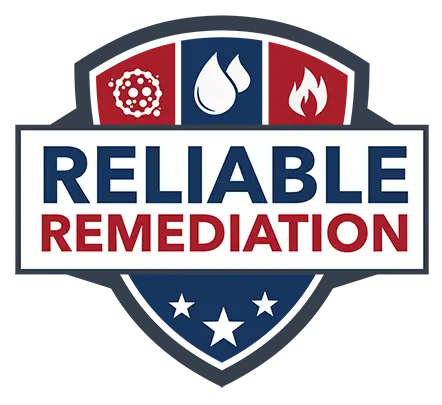Fire & Smoke Damage
Make your home safe even after the smallest fires. Call NowRequest an EvaluationRestore Peace of Mind
Rectify Hazardous Damage
Remove Smoke Odors
Did you know that even small cooking fires can be hazardous long-term?
If you had a small fire in your home, and you can still smell smoke after airing out the house, you’re continuously breathing unhealthy air.
After a fire, no matter the size, you want to make sure you and your home are safe and healthy.
Be confident that your home is safe after a fire.
Because airing things out isn’t always enough, with Reliable Remediation we’ll be there to restore affected areas after a fire. That way, you don’t have to worry about bad smells or negative health effects going forward.
When you work with us, we’ll:

Clean up how the fire was extinguished, drying out the house or cleaning chemicals from extinguishers.

Sanitize all surfaces from soot and residue on all affected building materials and personal belongings.

Coordinate the many vendors and projects during the restoration so you have more time to recover.
Fire Damage is More Than Just Flames
It’s heat, smoke, soot, and odors
A fire in your home can cause serious damage. Your home and many of the things in your home may be badly damaged by flames, heat, smoke, and water. You will find things not damaged by the fire may still be ruined by smoke and maybe soggy with water used to put out the fire. Anything you want to save or reuse will need to be carefully cleaned.
To fight the fire, firefighters may have broken windows and cut holes in the roof. This slows the fire’s growth and gets rid of dark smoke that makes it hard for firefighters to see. They may have cut holes in your walls to make sure that the fire is completely out and not hidden in the walls.

It is important to understand the risk to your safety and health even after the fire is out. The soot and dirty water left behind may contain things that could make you sick. Be very careful if you go into your home and if you touch any fire-damaged items.
There are fewer things more difficult to watch than flames cover your home or business. And after the fire trucks leave, there’s still more destruction to face – your burnt structure and belongings, perhaps charred beyond repair. If you’re lucky enough to escape with just minor damage, there may still be smoke and soot contamination and water damage from the firefighting efforts to deal with. Cleanup and restoration can be vast. You’ll be dealing with the absorption of smoke in all porous surfaces, ceilings, and walls. Soot will have covered and stained much of the damaged property, carpeting, and textiles too. And let’s not forget the actual damage to the structure of your property.
Fires cause more than $7.3 billion in property damage every year
Most home fires and fire casualties result from five causes:
- Cooking;
- Heating;
- Electrical distribution & lighting equipment;
- Intentional fire setting; and,
- Smoking materials
Fire damage comes from heat, smoke and soot, and odor (and residual water damage is possible from the extinguishing the fire) – it can affect a lot more areas of the structure than you might think due to traveling through utility chases (where electrical, plumbing, HVAC and ducting run). Every fire is different and every structure is different – this means you’ll want to use a professional and trained restorer with proper training and understanding of your individual needs and circumstances.
Important variables in the clean-up process are understanding:
- The material that burned;
- Was the fire oxygen-rich or oxygen-starved?;
- How long did the fire burn?; and,
- How hot did it burn?
Each variable affects how to properly clean and restore the structure and its contents. Hiring a professional that understands these variables and how they affect you, your property, and your claim is paramount in restoring your property safely and efficiently. Filing fire insurance claims enables you to repair or even rebuild your damaged home. “Actual cash value” policies entitle you to the amount it would take to return your home, including its contents, to its pre-fire fair market value. Always discuss coverage with your local insurance broker or agent for an understanding of how these things affect you and your liabilities.
Steps to Take After a Fire
After you’ve checked on your family and pets and notified loved ones about what has happened, here are some steps you should consider in order to start the process of getting your life back to normal:
1. Find a trusted advisor to help you through this process and stressful time.
2. Contact your local disaster relief service, such as the American Red Cross or the Salvation Army. They will help you find food, clothing, medicine, and a place to stay. You have a big job ahead of you. Get plenty of rest and ask for help. Do not try to do it all alone.
3. Call your local insurance agent or broker for assistance in filing your claim and understanding your policy and coverage.
4. Do not enter your damaged home or apartment unless the fire department says it is safe. The fire department will make sure the utility services (water, electricity, and gas) are safe to use. If they are not safe, firefighters will have your utilities turned off or disconnected before they leave. Do not try to turn them back on by yourself.
5. If it is safe to do so, secure your valuables (including any cash on hand, jewelry, and firearms).
6. Secure the property – board-up services and tarping will likely be needed to protect the property from the elements and secure it from theft or trespass.
7. Acquire alternative housing – even a small fire may require you to live somewhere else for a while;
8. Call the local police department to let them know the site will be vacant.
9. Begin saving receipts for any money that you spend related to the fire loss. The receipts may be needed later by the insurance company and to prove any losses claimed on your income tax.
It’s Easy to Get the Help You Need

Get an Evaluation

Receive a Customized Plan


